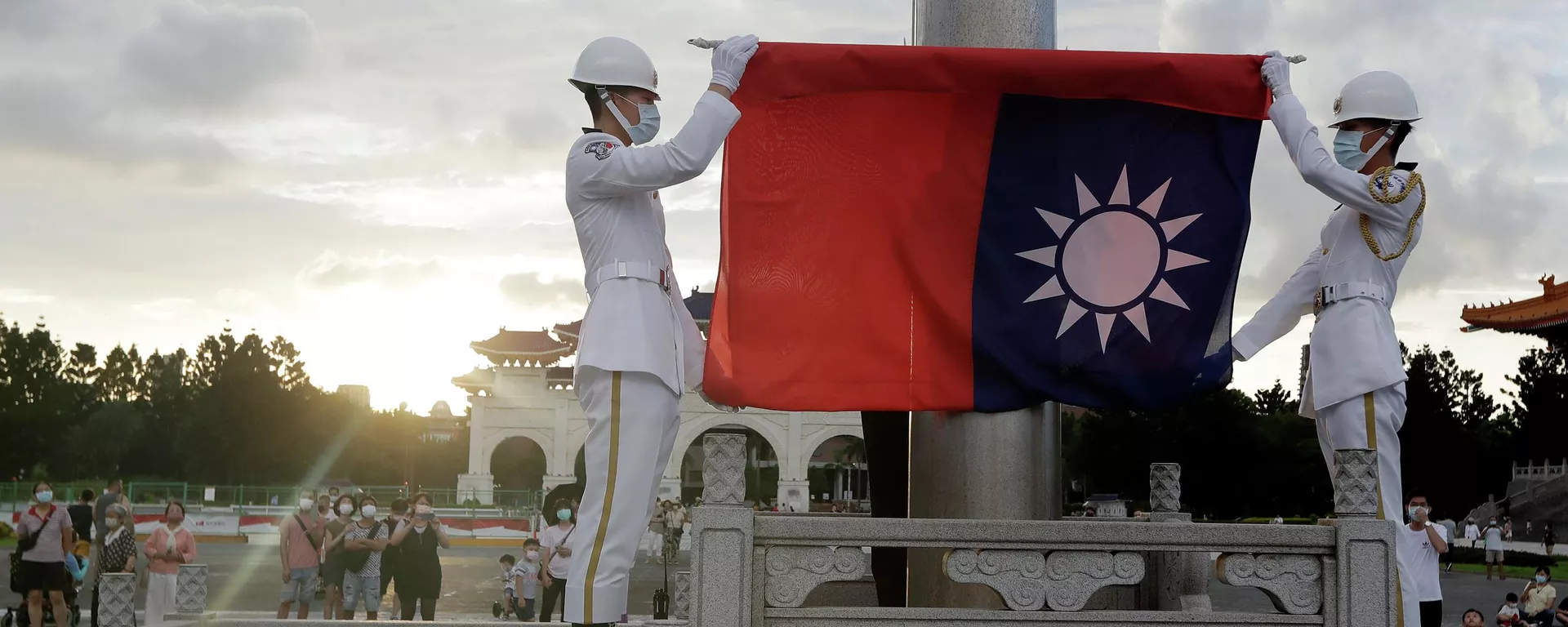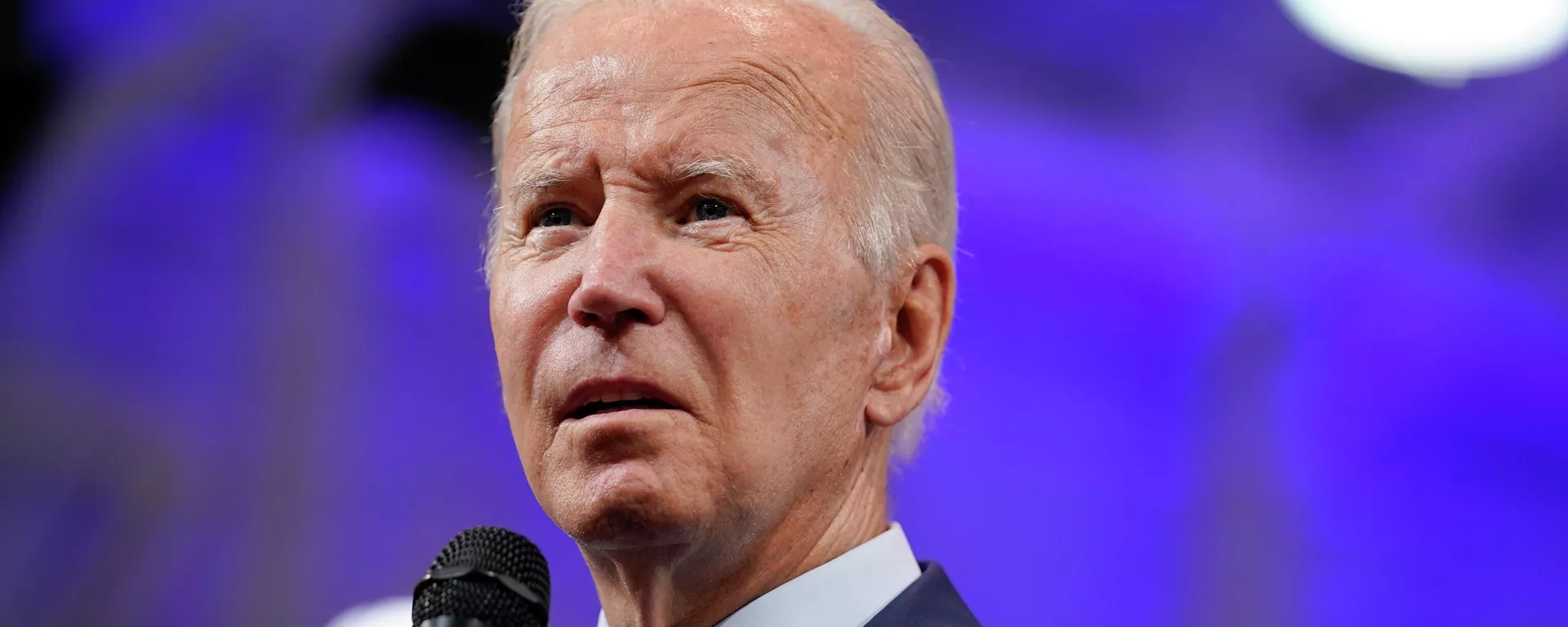https://sputnikglobe.com/20220922/macron-truss-show-no-consternation-over-biden-promising-to-defend-taiwan-militarily-1101072517.html
Macron, Truss Show ‘No Consternation’ Over Biden Promising to Defend Taiwan Militarily
Macron, Truss Show ‘No Consternation’ Over Biden Promising to Defend Taiwan Militarily
Sputnik International
US President Joe Biden provoked China’s ire for sending a “seriously wrong signal” after he said in a CBS 60 Minutes interview on Sunday that US troops would... 22.09.2022, Sputnik International
2022-09-22T07:30+0000
2022-09-22T07:30+0000
2023-06-19T12:45+0000
joe biden
emmanuel macron
liz truss
china
world
taiwan
https://cdn1.img.sputnikglobe.com/img/07e5/08/0a/1083568873_0:160:3073:1888_1920x0_80_0_0_424b2b86f1f20055f69f46ea9377654d.jpg.webp
Neither French President Emmanuel Macron nor UK Prime Minister Liz Truss expressed any consternation about Joe Biden’s recent remarks about Taiwan, a senior administration official said at a press briefing on the US President’s meetings at the United Nations.The issue of Taiwan came up in conversations President Biden had with his French and British counterparts on the sidelines of the 77th session of the UN General Assembly in New York.Responding to a question from the press regarding any discussion about joint or combined training exercises with Taiwan, the official said the issue had not been touched upon.Biden had earlier vowed that American forces would defend Taiwan in the event of an “unprecedented attack”.The island has been governed independently from mainland China since 1949, when it split from the mainland during a civil war that resulted in the Communist Party taking control. Beijing, whose official policy envisages a peaceful unification of Taiwan with mainland China, has engaged in rounds of talks with island authorities over several decades. Taipei, however, has persistently rejected Beijing’s proposal for "one country, two systems".Biden had been questioned about Taiwan in his first CBS 60 Minutes interview as commander-in-chief on Sunday. In the interview, the president also reiterated that he and his Chinese counterpart Xi Jinping agree with the One-China policy, adding that Taiwan makes its own judgment about its independence.After this comment, the White House was quick to affirm that the US' policy regarding Taiwan has not changed.“The president has said this before, including in Tokyo earlier this year. He also made clear then that our Taiwan policy hasn’t changed. That remains true,” a spokesman said later.On 23 May Biden again appeared to stretch the limits of the “strategic ambiguity” US policy towards the self-ruling island during a joint news conference with Japanese Prime Minister Fumio Kishida in Tokyo.When asked whether the United States would defend Taiwan if it were attacked, he replied, "Yes, that's the commitment we made." He added:At the time, an aide said the president's statement represented no change in the long-standing American stance on Taiwan.‘Seriously Wrong Signal’Responding to Biden's recent remarks, China said it was “strongly dissatisfied and resolutely opposed” to the comments, which sent a “seriously wrong signal” to Taiwan. According to China's foreign ministry spokeswoman Mao Ning, Beijing lodged a formal complaint over the statement.The US ended formal recognition of Taiwan after it established diplomatic relations with mainland China's Communist government in 1979. Biden reaffirmed Washington's commitment to the "One-China policy, guided by the Taiwan Relations Act (TRA), the three Joint Communiques, and the Six Assurances" during a virtual meeting with Chinese President Xi Jinping in November 2021. The "strategic ambiguity" theory, which the US has wielded to avoid stating whether it would militarily defend Taiwan, was also developed by the TRA. Although Washington acknowledges China's position that Taiwan is part of the People's Republic, it has never officially recognized Beijing's claim to the island and has continued informally to support Taiwan’s continued autonomy from Beijing.For years, the Chinese government has called on the US to refrain from interfering in domestic matters. Tensions escalated between Beijing and Washington over the controversial visit of US House Speaker Nancy Pelosi to Taipei in early August. At the time, Beijing warned that the Taiwan trip was "provocative" and actively "pushing the envelope on China's red lines".After the incident, Beijing launched large-scale military exercises in the Taiwan Strait. China also demanded that the United States stop military contacts with Taiwan to avoid further tension in the region, and warned that it will continue to take resolute and strong measures firmly to defend Chinese sovereignty and security interests.
https://sputnikglobe.com/20220919/bidens-taiwan-defense-vows-how-us-using-salami-slicing-strategy-to-dilute-one-china-principle-1100977719.html
https://sputnikglobe.com/20220919/covid-19-taiwan--2024-election-key-takeaways-on-bidens-first-60-minutes-interview-as-president-1100939815.html
china
taiwan
Sputnik International
feedback@sputniknews.com
+74956456601
MIA „Rossiya Segodnya“
2022
News
en_EN
Sputnik International
feedback@sputniknews.com
+74956456601
MIA „Rossiya Segodnya“
Sputnik International
feedback@sputniknews.com
+74956456601
MIA „Rossiya Segodnya“
joe biden, emmanuel macron, liz truss, china, taiwan
joe biden, emmanuel macron, liz truss, china, taiwan
Macron, Truss Show ‘No Consternation’ Over Biden Promising to Defend Taiwan Militarily
07:30 GMT 22.09.2022 (Updated: 12:45 GMT 19.06.2023) US President Joe Biden provoked China’s ire for sending a “seriously wrong signal” after he said in a CBS 60 Minutes interview on Sunday that US troops would defend the island of Taiwan "if in fact there was an unprecedented attack".
Neither French President Emmanuel Macron nor UK Prime Minister Liz Truss expressed any consternation about Joe Biden’s recent remarks
about Taiwan, a senior administration official said at a
press briefing on the US President’s meetings at the United Nations.
The issue of Taiwan came up in conversations President Biden had with his French and British counterparts on the sidelines of the 77th session of the UN General Assembly in New York.
“This is a significant issue - the potential for instability in the Taiwan Strait and what it could mean for security in the Indo-Pacific and for the global economy. I mean, this is going to be an issue that the President talks about with, you know, allies and partners alike,” the White House official stated.
Responding to a question from the press regarding any discussion about joint or combined training exercises with Taiwan, the official said the issue had not been touched upon.
Biden had earlier vowed that American forces would defend Taiwan in the event of an “unprecedented attack”.
The island has been governed independently from mainland China since 1949, when it split from the mainland during a civil war that resulted in the Communist Party taking control. Beijing, whose official policy envisages a peaceful unification of Taiwan with mainland China, has engaged in rounds of talks with island authorities over several decades. Taipei, however, has persistently rejected Beijing’s proposal for "one country, two systems".
Biden had been questioned about Taiwan in his first CBS 60 Minutes interview as commander-in-chief on Sunday. In the interview, the president also reiterated that he and his Chinese counterpart Xi Jinping agree with the One-China policy, adding that Taiwan makes its own judgment about its independence.
“We are not moving, we are not encouraging [Taiwan's] being independent ... that’s its decision,” he said.
After this comment, the White House was quick to affirm that the US' policy regarding Taiwan has not changed.
“The president has said this before, including in Tokyo earlier this year. He also made clear then that our Taiwan policy hasn’t changed. That remains true,” a spokesman said later.
On 23 May Biden again appeared to stretch the limits of the “strategic ambiguity” US policy towards the self-ruling island during a joint news conference with Japanese Prime Minister Fumio Kishida in Tokyo.
When asked whether the United States would defend Taiwan if it were attacked, he replied, "Yes, that's the commitment we made." He added:
"We agree with a One-China policy. We've signed onto it and all the intended agreements made from there. But the idea that [Taiwan] can be taken by force, just taken by force, is just not, is just not appropriate."
At the time, an aide said the president's statement represented no change in the long-standing American stance on Taiwan.

19 September 2022, 17:02 GMT
Responding to Biden's
recent remarks, China said it was “strongly dissatisfied and resolutely opposed” to the comments, which sent a “seriously wrong signal” to Taiwan. According to China's foreign ministry spokeswoman Mao Ning, Beijing lodged a formal complaint over the statement.
The US ended formal recognition of Taiwan after it established diplomatic relations with mainland China's Communist government in 1979. Biden reaffirmed Washington's commitment to the "One-China policy, guided by the Taiwan Relations Act (TRA), the three Joint Communiques, and the Six Assurances" during a virtual meeting with Chinese President Xi Jinping in November 2021. The "strategic ambiguity" theory, which the US has wielded to avoid stating whether it would militarily defend Taiwan, was also developed by the TRA. Although Washington acknowledges China's position that Taiwan is part of the People's Republic, it has never officially recognized Beijing's claim to the island and has continued informally to support Taiwan’s continued autonomy from Beijing.
For years, the
Chinese government has called on the US to refrain from interfering in domestic matters. Tensions escalated between Beijing and Washington over the
controversial visit of US House Speaker Nancy Pelosi to Taipei in early August. At the time, Beijing warned that the Taiwan trip was "provocative" and actively "pushing the envelope on China's red lines".
After the incident, Beijing launched large-scale military exercises in the Taiwan Strait. China also demanded that the United States stop military contacts with Taiwan to avoid further tension in the region, and warned that it will continue to take resolute and strong measures
firmly to defend Chinese sovereignty and security interests.

19 September 2022, 04:22 GMT




